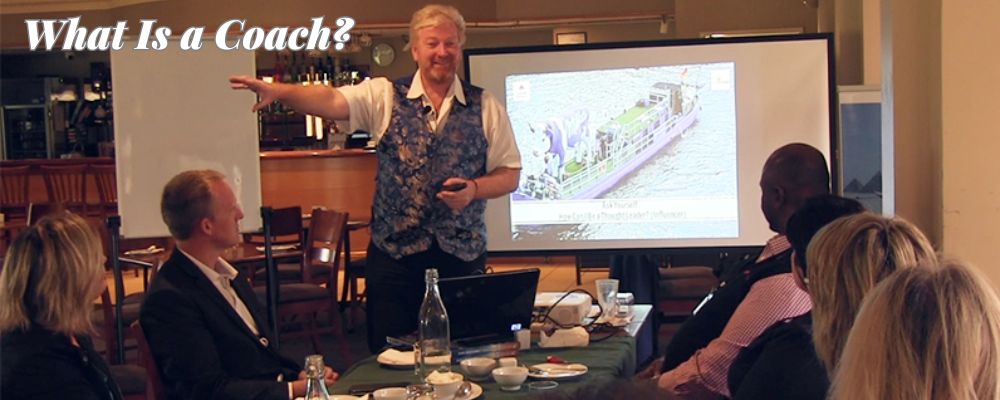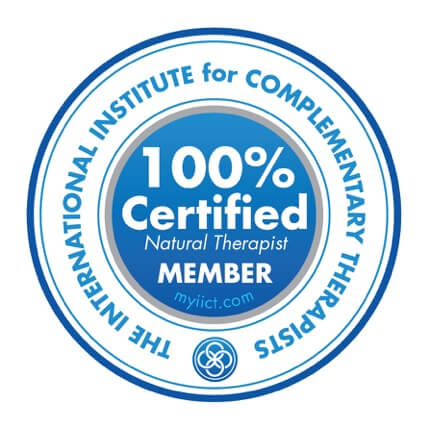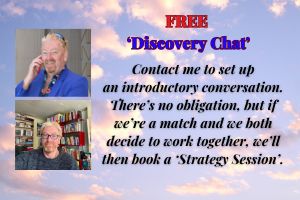
What Is a Coach?
What's the Difference between a Coach / Mentor / Consultant / Advisor / Counsellor / Therapist / Trainer / Presenter?
I have often found that I can fulfill several of those roles in one session because my clients can leverage from my experience.
That said, I must give you the disclaimer that I am not a qualified counsellor, psychologist or psychiatrist. Nor am I a financial planner or accountant. The advice I give is based on 40 years' of experience, setting up and running around 20 or so business ventures and a lot of varied business and life experience. I am also a qualified NLP Trainer and a VET certified Trainer and Assessor, and I'm a member of the International Institute for Complementary Therapists.
The first question, for those who may have never worked with these types of professionals is,
'What are the differences between them?'
Let's offer some definitions...
Coaching
Coaching has been defined in many ways. The essence of coaching is:
- To help a person define what they really want, or don't want, to help devise a strategy to change in the way they wish and to help them go in the direction they want to go.
- Coaching supports a person at every level in becoming who they want to be, rather than who they perceive they currently are.
- Coaching builds awareness, identifies choices and empowers the client, leading to change.
- Coaching unlocks a person's potential to improve their performance in a chosen area or areas - often the coach can see things in the client that they cannot yet see in themselves, and may believe in the client more than they believe in themselves.
- Coaching tends to be more of a guiding process to help the client find the answers within themselves, usually with incisive and intuitive questioning techniques.
Most people are used to seeing coaches at work in the sporting world. Every top athlete has a coach. In the last decade or so, however, coaching has become applicable in every area, in business and in every aspect of life as well as in sports. Now, it is quite normal for someone to see a coach to help them achieve their goals in their life and work.
Coaches and their clients can form strong bonds because the client is often revealing their innermost thoughts, and of course, such information remains confidential. Results are only ever mentioned with the prior permission of the client.
The coach helps the client to achieve their personal best and to produce the results they want in their personal and professional lives. Coaching ensures the client can give their best, learn and develop in the way they wish.
The coach need not be an expert in their clients’ field of work. For example, the coach of the world's number one tennis player does not need to have been the world's best. They simply need to be really good at coaching!
Mentoring
Mentoring in the work environment is when a senior colleague, who may be seen as more knowledgeable and wise gives advice and acts as a role model. Mentoring can also be from a person who is usually perceived as older and wiser, and sometimes involves wide ranging discussions that may not be limited to the work context. A mentor is a sponsor with great professional experience, usually, though not always, in their client’s field of work.
It can also be when someone has achieved what you wish to achieve, or something similar. For example, as an entrepreneur myself, I can mentor other entrepreneurs or would-be entrepreneurs. The advice tends to be offered from a place of experience with a recommended course of action, based on the discussions and the agreed needs of the mentee.
Both mentoring and coaching are concerned mainly with achievements in the present and the future.
Consulting
This is when you engage an expert to provide solutions to problems. They usually offer ways to improve performance by observing practices and measuring results, often interviewing team members to gain insights, and by making recommendations. It is based on past and current performance, with the intention of improving future outcomes, and it usually tends to focus on systems and processes more than people, though it may identify human resource planning needs. Find out more about consulting.
Advising
Generally in a business context, this is virtually the same as consulting, but perhaps with a little more emphasis on giving direction, rather than presenting alternative choices.
Counseling
Counseling is working with a client who may feel uncomfortable, or dissatisfied with their life, or aspects of it. They are seeking guidance and advice. A counselor works remedially on a client’s problem.
Therapy
Therapy is working with clients who seek relief from psychological or physical symptoms. The client wants emotional healing and relief from mental pain. Therapy deals with the client’s mental health, whereas coaching deals with the client’s mental growth. The client’s motive for entering therapy or counseling is usually to get away from pain or discomfort, rather than moving towards desired goals. Coaching is not remedial, it is generative. Both therapy and counseling are more likely to involve understanding and working with past experience than coaching.
Neuro Linguistic Programming or Patterning (NLP) helps the client to see their repeating behaviour patterns, to identify what may have caused these and to reframe their perspectives, so they can move forwards towards their identified future goals. It offers more of a layman's approach than the deeper nature of therapy. Find out more about NLP.
Training
Training is about imparting specific skills, knowledge or abilities from the trainer, who is usually perceived as an expert in the subject, to trainees, who wish to learn the specific skills ready for their application.
Presenting, Facilitating or Teaching
The presenter or facilitator may not necessarily be an expert in the topic on which they are presenting, such as in lecturing at TAFE, though it definitely helps if there are! Their role is to present information, which may have been created by other people, and to facilitate learning by their students.
Trainers, presenters, facilitators and teachers should have the answers, whereas with coaching, the coach helps the client to find their own answers.
Working with Me - Tony Inman
Now that you have some definitions, let me just say that it's often been my experience when working with clients, that I might switch from wearing one, to several, of the above hats during a single session.
That said, I always reference my disclaimers that I do not purport to give financial advice, other than what is based on my own experiences (I'm not a financial advisor, accountant or tax consultant); I am not a qualified psychiatrist, psychologist or counselor, though I am a certified NLP Trainer and Master Practitioner and a VET certified Trainer and Assessor, plus a certified Coach.
My business recommendations are based on my 40 plus years of general business experience and having set up over twenty of my own ventures, and obviously I cannot 'make you' act on anything.
My life coaching is based on coaching and mentoring thousands of business owners, executives, employees and previous clients in over 44 years of managing and leading people.
Let's find out more about working with Tony Inman
What YOU Can Do Next
- Please feel free to check my reviews from former clients.
- Feel free to have a chat over the phone or over a coffee first before you decide.
- If the timing is not quite right for you yet, feel free to follow my blogs and social media or read my book.
- Find out more about the process of working with a coach like me.
- Coaching - Frequently Asked Questions (FAQ)
Please feel free to invest in YOU by working with me.
Leave a message for Tony on +61 419 860 382 or contact here.











